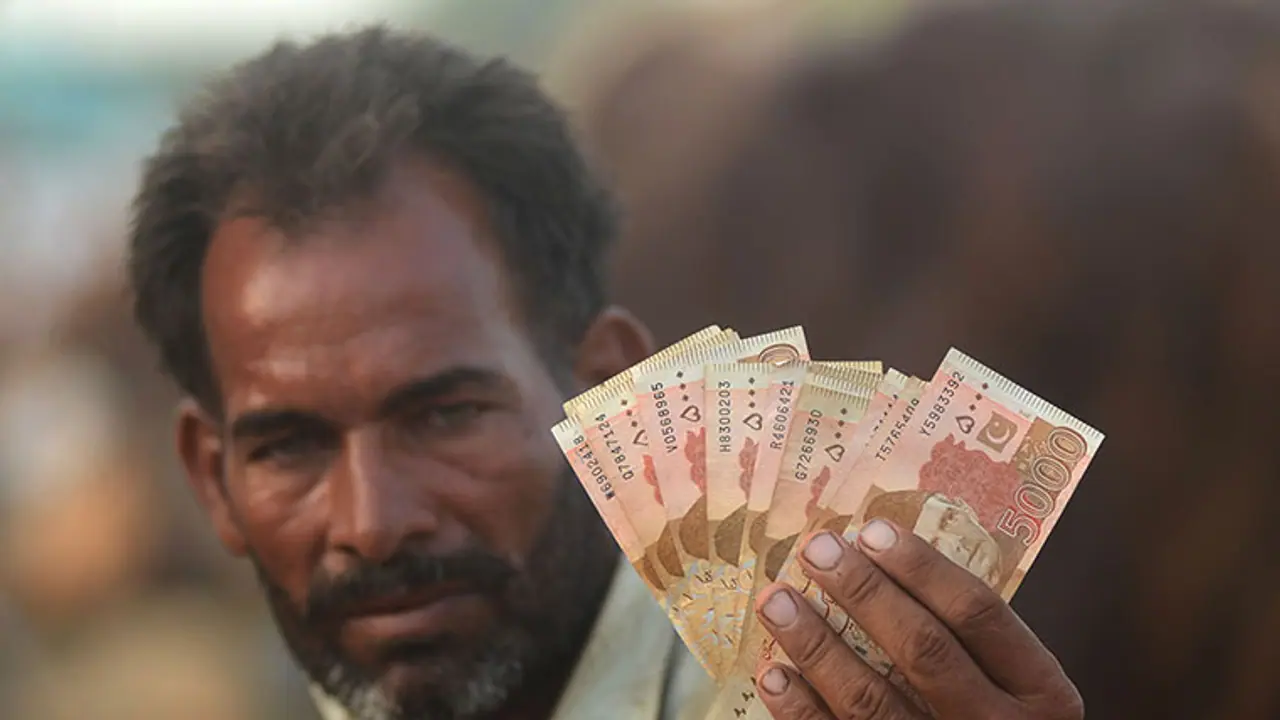Observers claim that the Pakistani terror is financed by the sale of hides, donated at the end of Eid every year. Hafiz Saeed set up camps across the country appealing people to donate for the ‘Kashmiri struggle for Freedom’.
After thirty years in business, the Muttahida Qaumi Movement (MQM), a violent political party that once controlled Karachi announced this time round that they would not collect animal hides after Eid.

For years the MQM ran their charitable foundation, Khidmat-e-Khalq, by selling hides collected from Bakrid sacrifices.
Last year paramilitary Rangers snatched hides from the MQM and distributed it to others.
In recent months the authorities have hounded the MQM. The operations intensified following its self-exiled leader Altaf Hussain’s statement in August this year when he said “Pakistan is a cancer for the whole world” and is an epicentre of terror.
More than a 100 party offices of the MQM were demolished in Karachi where it was once the most dominant political force.
In Pakistan, Eid is not just about sacrifice and festivity. The slaughter of animals generates an estimated ₹2.5-3 billion from the sale of hides.
Just to get a sense of how big this business is, according to the 2015 report of the Tannery Association of Karachi, 7.3 million animals were sacrificed in 2014 that included cows, goats, sheep and camels.
The business has zero investment because residents donate hides, or they are collected, so proceeds from the sale of hides are a hundred percent profitable venture.
But the story is not just about the economy around religious sacrifices. This is about terror financing.
Terrorist organisations collect hides on the pretext of helping Muslims, but the money is allegedly spent on militant activities.
Though the National Action Plan following the Peshawar APS massacre in 2014 agreed that source of finances would be choked, of not just jihadists but all sectarian forces, state sanction to these groups to raise money by selling hides defeats the action plan.
In August this year, Army chief General Raheel Sharif admitted lack of progress on the implementation of the National Action Plan (NAP).
He added that it was damaging the progress of the ongoing military operation Zarb-e-Azb that started two years ago.
But he continues with the policy of selective campaign against terror groups.
The biggest share of the hide booty goes to banned militant organisations linked to the Al Qaeda - like the Tehreek-e-Taliban and of course Hafiz Saeed’s Jamat-ud-Dawa’s charitable branch Falah-i-insaniyat Foundation.
Observers claim that the terror strikes against Pakistanis, as well as the war against India in Kashmir, is financed by the sale of hides.
In fact this Eid, Hafiz Saeed set up camps across the country appealing people to donate for the ‘Kashmiri struggle for Freedom’.
The Ahle Sunnat Wal Jamaat (ASWJ), a banned Sunni militant organisation, has also been given the NoC (No Objection Certificate) for hide collection.
But why has Pakistan allowed banned groups to raise money?
On the one hand, it has virtually forbidden legitimate political parties from collecting hides, whereas organisations the state has banned are allowed to run their terror empire through the sale of the same.
This follows the same skewed strategy of distinguishing between a ‘good Taliban and a bad Taliban’.
For years, the army, which is the de facto state, has nurtured these terrorist organisations to be used against India and Afghanistan. And this policy has only helped them finance terror under the hide.
The International Convention for the Suppression of the Financing of Terrorism requires member states to take measures to protect their financial systems from being misused by people or groups engaged in terrorist activities.
But terror financing is a complex web of linkages between financing obtained on the one hand through charities, seemingly legitimate businesses operating as fronts, and on the other hand through criminal activities running from money laundering, abduction, organised crime, human trafficking, gun running and the narcotics trade.
But the overriding issue confronting agencies tracking terror finance is the role that Sharia-compliant financing and Islamic charities play in the network of paymasters for terror.
Unless Pakistan makes hard choices and recalibrates their approach to terror, these groups will continue to move freely and wage 'war' against neighbouring countries.
Kishalay Bhattacharjee is a senior journalist and author. His most recent book is Blood on my Hands: Confessions of Staged Encounters (Harper Collins 2015). The views expressed here are his own.
